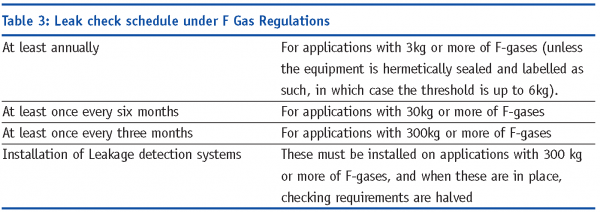Refrigerants and legislation in the UK
- Like
- Digg
- Del
- Tumblr
- VKontakte
- Buffer
- Love This
- Odnoklassniki
- Meneame
- Blogger
- Amazon
- Yahoo Mail
- Gmail
- AOL
- Newsvine
- HackerNews
- Evernote
- MySpace
- Mail.ru
- Viadeo
- Line
- Comments
- Yummly
- SMS
- Viber
- Telegram
- Subscribe
- Skype
- Facebook Messenger
- Kakao
- LiveJournal
- Yammer
- Edgar
- Fintel
- Mix
- Instapaper
- Copy Link
Posted: 28 February 2008 | Miriam Rodway, Secretary, Air Conditioning and Refrigeration Industry Board | No comments yet
You most probably rely on it for the operation of your food processing and storage systems – but how much do you know about your refrigerating equipment and the environmental obligations you have for the refrigerant they contain under UK law?
You most probably rely on it for the operation of your food processing and storage systems – but how much do you know about your refrigerating equipment and the environmental obligations you have for the refrigerant they contain under UK law?
You most probably rely on it for the operation of your food processing and storage systems – but how much do you know about your refrigerating equipment and the environmental obligations you have for the refrigerant they contain under UK law?
Recent European legislation means that you, as the owner of refrigerating and cooling equipment, are now liable for prosecution if you do not comply with regulations designed to minimise the emissions of refrigerant. Many industrial and commercial companies do not have in-house technical expertise in refrigeration and in the past they have relied heavily on contractors for advice in these areas. Under the new regulations, it is increasingly difficult to delegate your legal responsibilities to service and maintenance contractors.
So what should you do? As an equipment operator, your first step should be to identify what refrigerating equipment you are responsible for. If your equipment contains HFC or HCFC refrigerants, you will need to carry out an audit of what is on each site and what type and quantity of refrigerant it contains. You will probably need the assistance of a qualified refrigeration engineer to do this.
Your next step should be to identify your obligations under the key environmental refrigerant legislation.
HCFC refrigerant equipment
The EU Regulation 2037/2000 on ozone depleting substances and in the UK and the Ozone Depleting Substances (Qualifications) Regulations 2006 (Statutory Instrument 2006 No. 1510) cover requirements relating to HCFC refrigerants such as R22.
Typical refrigerants are shown in Table 1.
The requirements of these regulations came into force in 2000 and include:
- Operators of HCFC refrigeration systems must take “all precautionary measures practicable” to prevent leakages.
- Any system containing more than 3 kg of HCFC refrigerant must be checked annually for leakage, by suitably qualified personnel.
- Any HCFC refrigerant removed from a system during maintenance or at end of life must be properly recovered for re-use, recycling or destruction.
- A timetable for the phase out of use of these refrigerants in existing equipment. The Regulation will ban the use of virgin R22 as a “top-up” fluid for maintenance from 2010 and the use of recycled fluid is banned from 2015.
HFC refrigerant equipment
EU Regulation 842/2006 on certain fluorinated greenhouse gases (F-Gases) and in the UK, the UK Fluorinated Greenhouse Gases Regulation of 2008 (statutory instrument 41) relate to HFC refrigerants such as R134a or R404A.
Typical refrigerants are shown in Table 2.
Here, the requirements for operators of equipment are much more detailed and stringent and are targeted primarily at stationary refrigeration, air conditioning and heat pump units over 3kg charge (6kg if hermetic). These came into force in July 2007. Here, you must:
- Prevent leakage, and repair any leaks as soon as possible.
- Arrange appropriate refrigerant recovery by certified personnel during servicing and disposal.
- Ensure that only certified competent personnel carry out leakage checks.
- Maintain records of refrigerants and of servicing.
- Carry out leak checks to the schedule, shown in Table 3.
What should you be doing now?
If you are an equipment operator with a legal responsibility under these regulations, you should already be:
- Using only certified personnel to work on their HFC and HCFC equipment. This currently means that personnel working on these types of equipment in the UK must have a recognised national refrigerant handling qualification either a City and Guilds 2078 or CITB equivalent. Although updated qualifications are likely to be introduced later this year which will be mutually recognisable throughout Europe.
- Ensuring an adequate leak check programme is in place and that the checks are being carried out by certified personnel. Where leaks are identified, you must take steps to ensure that they have been rectified. Where specified leak detection systems should be in place.
- Keeping records for all equipment containing over 3kg of HFC gases.
These records must include:
- Quantity and type of F-gases installed, added or recovered.
- Identification of the company or technician carrying out servicing and details of the Operator.
- Dates and results of leakage checks, specifically identifying separate pieces of equipment containing 30kgs or more of refrigerant.
Operating equipment containing HCFC refrigerants, which are subject to a phase out, need to consider now, what options are available to them if they wish to continue operating this equipment in the future. This may mean planning to replace equipment or retrofitting with an alternative refrigerant. Your contractors or refrigerant supplier should be able to recommend suitable options.
A word about compliance and enforcement
A programme to support compliance with the F Gas Regulations in the UK is being developed by the Department for Environment Food and Rural Affairs (DEFRA). This will be launched early this year and will include a help desk and support team to provide individual advice and guidance.
Penalties for non-compliance with the regulations in the UK are quite serious. Statutory instruments provide enforcement authorities with the power to serve enforcement and/or prohibition notices on equipment, where the operator is in contravention of the requirements. The prohibition notices will specify action that must be taken. A person found guilty of an offence under the Regulations is liable, on summary conviction in a Magistrates’ Court, to a fine up to the statutory maximum (up to £5,000) and an unlimited fine on conviction in the Crown Court.
Where to go for further information
Practical guidance is now becoming available for these requirements through the UK Air Conditioning and Refrigeration Industry Board, who represent contractors, manufacturers, users and engineers, involved in stationary refrigeration and air conditioning equipment. The Board have worked closely with UK Government officials in the Department for Environment Food and Rural Affairs and the Department for Buildings Enterprise and Regulatory Reform on the implementation of the requirements. ACRIB also run a voluntary register of certified refrigerant handling personnel, issuing registration cards to individuals. A voluntary register of companies is available at www.refcom.org.uk.
On the ACRIB website at www.acrib.org.uk you can find the following helpful information and advice:
- A sample equipment register.
- Link to advice on how to calculate the amount of refrigerant in a system.
- Leaflets on F Gas regulation requirements for End Users.
- Statement on the certification of personnel under F Gas Regulations.
- Summary of requirements of the ODS Regulations.
Links to the text of both of these Regulations and further guidance for industry can also be found at www.berr.gov.uk/sectors/sustainability/















